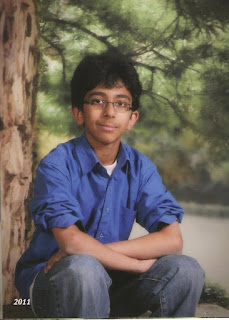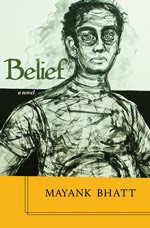 |
| Che at his school concert |
2011 turned out to be a momentous year in many ways. Some of India’s biggest and most enduring cultural icons left us – Dev Anand, Shammi Kapoor, Mansur Ali Khan Pataudi, and Maqbul Fida Husain. Each had carved a special niche amongst Indians with their achievements.
Husain’s death was tragic. The artist who had shaped aesthetic sensibilities in post-independence (and post-colonial) India had to live his last few years in exile, fearful that if he continued to live in India, he would be apprehended and imprisoned for hurting the Hindu religious sentiments because he had preferred to paint Hindu goddesses (and Mother India) in the nude. One should bear in mind that all this happened before Narendra Modi changed India irreversibly and forever in 2014.
 |
| Bharat Mata by MF Husain |
On May 1 2011, American soldiers killed Osama bin Laden in Abbottabad, Pakistan. The man redefined our world and his ideology of terrorism divided (divides) people as nobody else has since perhaps Leninism did in the early 20th century. The manuscript that I was working on was primarily based on the ideology of hatred preached by Laden and his foot soldiers in the Islamic world.
The year began with the Islamic world suddenly seized by an urgent need for a revolution. Led by social media, the youth of Egypt took to streets and demanded democracy; young people from across the Middle East joined in. Briefly, with the ouster of Mubarak in Egypt and the brutal street lynching of Gaddafi, it seemed that after all these years of being under brutal dictatorships the region would see the birth of democracy.
It appeared that perhaps George Bush Jr had been right all along – that invading Iraq had been about ushering democracy in the Middle East. Of course, that was not to be, and aided and abetted by the United States of America (then under Obama administration, with Hillary Clinton as Secretary of State) throttled democracy and reinstated a military dictatorship in Egypt, leaving most of the Middle East smouldering.
Also in 2011, the world’s population crossed 7 billion, and the seven billionth baby was born in India, and India won the World Cup, fulfilling Sachin Tendulkar’s dream.
However, this is not the place for a detailed discussion on global sociopolitical and cultural issues. This blog is about Mahrukh, Che, Canada, and me. For all of us, the year was turning out to be immensely important. Che graduated from the middle school and decided to go to the York Memorial Collegiate for high school. He had become an independent-minded young adult who took his own decisions.
 |
| Che's graduation from Middle School |
In school, he learnt to play the clarinet and was included in the school’s concert choir. It was probably a routine matter, but for us – immigrant parents – it was an amazing achievement and we took pains in ensuring that he was dressed appropriately. Che’s transformation had been the quickest because he went to school and there is nothing better than grassroots education to ensure comprehensive integration.
Mahrukh, who had completed her program in social work from Medix, was courageously working as a volunteer with different settlement agencies across Toronto. She was gaining tremendous experience and was acquiring firsthand knowledge about the intricacies of the settlement process. However, she remained singularly unlucky because while everyone admired her abilities and skills, nobody was willing to offer her a regular job.
I’d continued to work on my manuscript and an extract of my unpublished manuscript was published as a short story in the Indian Voices Vol I published in India by CP Thomas and edited by the formidable Jasmine DaCosta, who had already included another extract from the manuscript in the Canadian Voices Vol II. I was one of the readers at the launch of the collection at Toronto’s Supermarket Bar. I was delighted that MG Vassanji and Nurjehan Aziz were among the audience. The hugely talented Farzana Doctor was the other reader. This was my moment under the spotlight (literally) and I enjoyed it every bit.
 |
| At the launch of Indian Voices Vol I |
Jasmine DaCosta introduced us to Mariellen Ward, a travel writer of repute, who did an interview with the group (Jasmine, Farzana and Niranjana Iyer) about new Indo-Canadian writing in Toronto and got it published in the Maple Tree Literary Supplement edited by the versatile Amatoritsero Ede. Read about it here:
Defining Indo-Canadian writing
My association with MG Vassanji had continued even after I completed my program in Creative Writing under his guidance at Humber College and he included me in the core group of the organisers of the Festival of South Asian Literature and the Arts (FSALA). Along with the other committee members, I was to organize the second edition of the festival. I’d participated in the first edition in 2009 and had gone to the Robert Gill Theatre Koffler Centre at the U of T (St. George) at the reading of Bapsi Sidhwa (Ice Candy Man / Earth); Anosh Irani and Tahira Naqvi also read at the event.
For 2011, the program was perhaps a bit more ambitious with over 30 authors participating, including the iconic Girish Karnad, the Jnanpeeth award-winning playwright of groundbreaking plays such as Tughlak and Naga-Mandala. The festival also acknowledged Rabindranath Tagore’s 150th birth anniversary and Faiz Ahmed Faiz’s centenary. Ananya Mukherjee of York University performed an amazing skit in Bengali based on Tagore’s writings. For an academic, it was truly a jaw-dropping performance. I told her she’d have succeeded as an actor, too, had she tried.
Read about the festival here:
The festival was remarkable in many ways. I had the privilege on meeting two of the best playwrights in India – Girish Karnad and Mahesh Dattani. Dalbir Singh, at that time a student, interviewed both of them at a scintillating session. With Karnad, I managed to have an exclusive chat as I walked with him back to the hotel. He was more concerned that I’d be cold because I wasn’t wearing any warm clothes.











